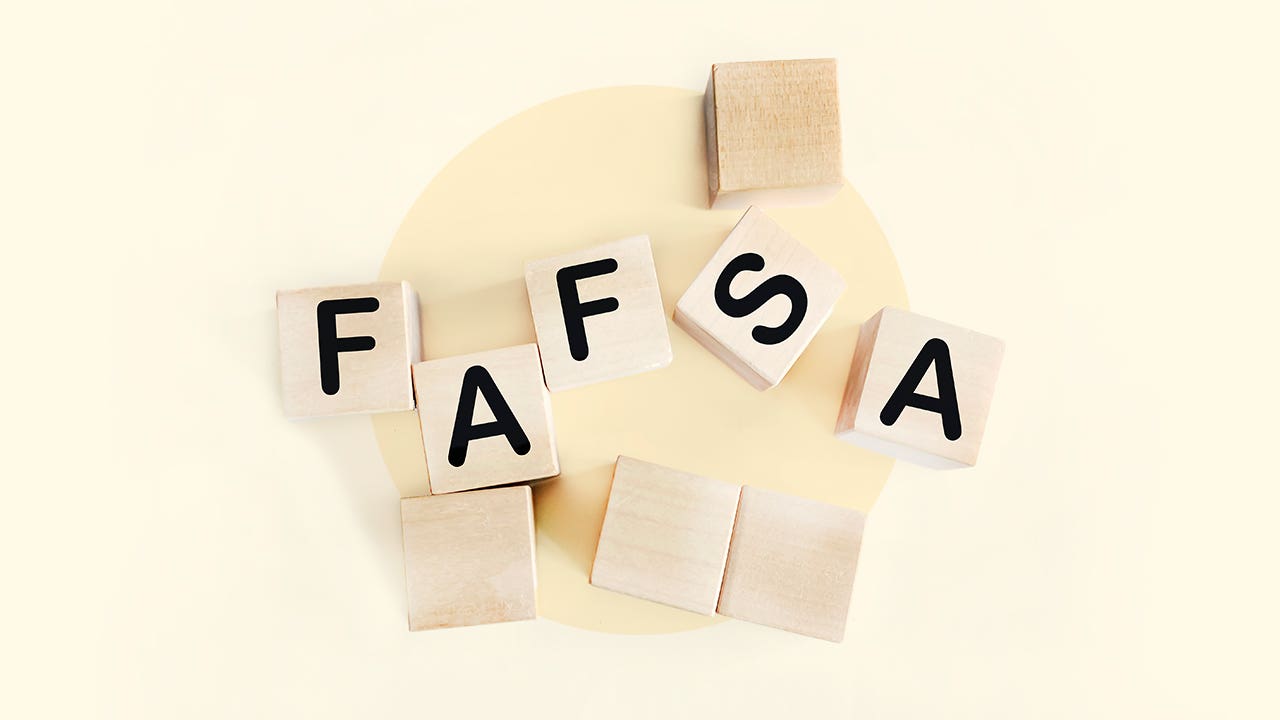What you need to know about FAFSA requirements

In the news: FAFSA form opens early for 2026-27
Key takeaways
- With the cost of college rising, it’s even more important to understand the financial aid application process.
- The basic FAFSA eligibility requirements include being a U.S. citizen or eligible noncitizen and having a high school diploma or GED.
- Though FAFSA is a great option for financial aid, there are other alternatives available.
Even if you don’t think you’ll need help paying for college, be sure to fill out the Free Application for Federal Student Aid (FAFSA). It tells you how eligible you are for federal loans, but also for grants and work-study programs.
Currently, the FAFSA 2026 requirements are not significantly different from past years. The application for the 2026-27 academic year opened on September 24, and closes on June 30, 2027, but many states have earlier deadlines for state-based aid. Some types of aid are offered on a first-come, first-served basis, so the earlier you fill out the FAFSA, the better.
Basic FAFSA eligibility requirements
To be eligible for federal financial aid:
- Be a U.S. citizen or eligible noncitizen with a valid Social Security number (with certain exceptions).
- Have a high school diploma or a GED certificate.
- Be enrolled or accepted for enrollment in a qualifying degree or certificate program.
- Maintain satisfactory academic progress while in school.
- Not be in default on federal student loans or owe money on a federal grant.
- Show financial need for need-based programs.
The US Department of Education does not list certain age, income or GPA FAFSA qualifications. Each case is determined individually, so you won’t currently see barriers of this nature. You may need satisfactory academic progress to keep financial aid at your institution. Credit checks or scores are also not required.
For the 2025-26 award year, males between the age of 18 and 25 no longer need to register with the Selective Service to receive federal aid. You’ll also need to show some financial need as part of FAFSA eligibility, which is determined through your cost of attendance (COA) and Student Aid Index (SAI).
The requirements are largely the same if you’re an independent or dependent student. The only difference is that independent students won’t need to list parental information, only themselves and their spouse if they are married.
With current administration changes, these requirements may be subject to change suddenly. Work with your institution’s financial aid office to keep abreast of developments.
FAFSA requirements for non-US citizens
There are special requirements for non-US citizens. Currently, non-citizens eligible to fill out the FAFSA are defined as someone who is or has the following:
- A US national or permanent resident.
- An Approval-Departure Record from US Citizen and Immigrations Services showing an approved status such as refugee, granted asylum, conditional permanent resident, Cuban-Haitian entrant or parolee.
- A T-visa or having a parent with a T-1 nonimmigrant status.
- A battered immigrant-qualified alien.
- A citizen of the Federated States of Micronesia, the Republic of the Marshall Islands or the Republic of Palau.
Undocumented students are currently not eligible for federal student aid. Despite this limitation, the FAFSA may help you apply for state or school financial aid. A parent’s or spouse’s immigration or citizenship status does not currently affect the FAFSA.
FAFSA requirements for students with criminal convictions
The FAFSA requirements for those with a criminal background vary depending on where one is in their sentencing.
- Students currently confined in adult correctional or juvenile justice facilities: The US Department of Education lists limited eligibility for financial aid. Student loans are inaccessible, but Pell Grants, Federal Work-Study and Federal Supplemental Educational Opportunity Grants may be an option. You would need to talk to the director of the correction facility about partnering with a qualified educational program.
- Students exiting incarceration: All eligibility limitations related to incarceration are removed once you’re released.
- Students on probation or parole: You may be eligible for federal student aid and can fill out the FAFSA.
Currently, drug convictions do not affect federal aid eligibility. Those convicted of a sexual offense may qualify for a Pell Grant.
FAFSA requirements for students with intellectual disabilities
Those with an intellectual disability may receive funding for the following:
- Federal Pell Grant.
- Federal Supplemental Education Opportunity Act.
- Federal Work-Study programs.
Students with intellectual disabilities must also match three requirement categories:
- Enrolled in a comprehensive transition and postsecondary (CTP) program for people with intellectual disabilities at a higher education institution that is part of federal student aid programs.
- Maintaining satisfactory academic progress.
- Meet general student eligibility requirements, but the student does not have to be getting a degree/certificate or have a high school diploma/GED.
Can you lose FAFSA eligibility?
Federal financial aid can be incredibly helpful for students in need, but it’s not guaranteed. Here are some situations that may cause you to lose your eligibility, at least temporarily:
- Your grades slipped: Not making or keeping up satisfactory academic progress means that you could lose your eligibility. You can file an appeal if you disagree with the school’s decision or have a good reason for not keeping up.
- You forgot to renew: Remember, FAFSA requirements include submitting a new application every year you’re enrolled in school and need financial assistance. If you don’t complete the form, you won’t get additional funding for the following school year.
- Your parents didn’t file taxes: Although you may still be eligible for unsubsidized federal student loans, you won’t be eligible for grants, work-study programs or other need-based federal aid, as the Department of Education won’t be able to calculate your SAI.
- You defaulted on student loans: If you’ve previously had student loans that you didn’t repay, there’s a chance that they went into default. This is most applicable to graduate, professional and returning students who have taken out loans before. The same applies if you owe money on a federal student grant.
- Your citizenship status expired: If you were an eligible noncitizen but your status expired, you’ll lose eligibility until you can reinstate it.
- You become incarcerated: Being incarcerated means you may no longer qualify for federal loans.
- Your income increased: If you, your parents or your spouse are earning more, that may affect how much you qualify for financial assistance, since certain types are based on financial need.
- You dropped down to half-time or left school early: Some eligibility and aid amounts are based on whether you are a full-time student.
Work with your institution’s financial aid office to stay up-to-date on FAFSA and educational requirements so that you don’t lose financial aid eligibility.
Alternatives to the FAFSA
The FAFSA is a great place to start with getting money to pay for college, but it’s far from the only way to raise funds. Other options include:
- Grants and scholarships: Your college may offer merit- and need-based scholarships and grants that are available outside the FAFSA. Additionally, you can apply for scholarships and grants from private organizations through scholarship search engines. Both websites maintain databases with millions of opportunities.
- Private student loans: It’s best to apply for federal loans before private loans. Most federal loans don’t require a credit check, and the Department of Education provides certain benefits you can’t get from private lenders. Private student loans can fill the gap if you need more finances.
- Savings: You and your parents (even relatives, such as grandparents or aunts and uncles) can save for college costs through a 529 plan, which allows for tax-free growth and tax-free withdrawals as long as they’re for eligible expenses. Additionally, many states offer additional tax breaks in the form of deductions or credits to encourage educational savings.
- Income: While it’s not always ideal, getting a part-time job while you’re in school can save you thousands of dollars in student loan debt over the entire time you’re in school. If your class schedule and homework make having a job on the side difficult, try to work during the summer.
- Employer assistance programs: If you’re already employed, you can ask your HR department if your company offers some college aid in tuition reimbursement.
Bottom line
Filling out the FAFSA through your school can help you learn what federal and state financial aid you are eligible for. The largest benefit of filing out the FAFSA is that you may qualify for grants, which you do not have to pay back. You may also learn about federal loans, which carry greater consumer protections than private loans like debt forgiveness.
Why we ask for feedback Your feedback helps us improve our content and services. It takes less than a minute to complete.
Your responses are anonymous and will only be used for improving our website.




